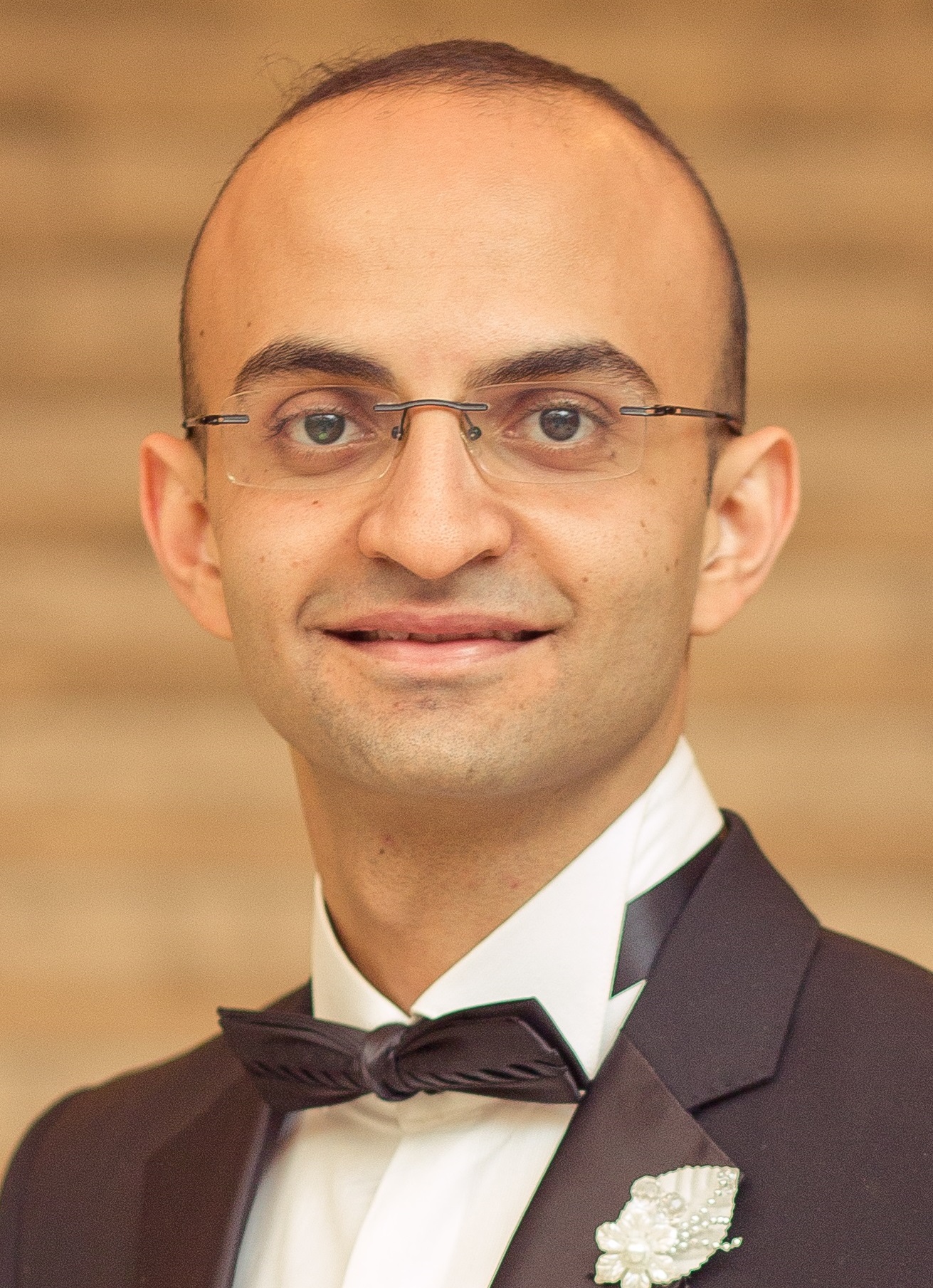About
Welcome! I am Mohamed Ibrahim, a Research Faculty Member at the Georgia Institute of Technology and an Incoming Assistant Professor at the University of Texas at Dallas starting in Fall 2025. Before joining Georgia Tech, I was a Postdoctoral Researcher at the University of California, Berkeley. My research focuses on efficient hardware-software co-design and optimization methodologies to advance embodied intelligence. This research combines brain-inspired computing, embedded cyber-physical integration, design automation, and VLSI AI hardware systems to develop cutting-edge algorithms and build innovative hardware architectures, aiming to create embodied AI systems that are inherently adaptable, reliable, and trustworthy.
I received my Ph.D. and M.Sc. degrees in 2018 and 2017, respectively, both in Electrical and Computer Engineering from Duke University. Following my PhD studies, I worked for three years in the semiconductor industry. I have also been on the technical program committees for multiple conferences, including ICCAD, DATE, ASAP, and ASP-DAC. Additionally, I serve as an expert reviewer for a large number of conferences and journals.
My research has been recognized with prestigious awards, including the Council of Graduate Schools/ProQuest Distinguished Dissertation Award in Mathematics, Physical Sciences, and Engineering, and an Outstanding Dissertation award from the department of Electrical and Computer Engineering at Duke University. I also received a Best Paper Award at the 2017 DATE Conference.
"I'm excited to share that I will be joining the University of Texas at Dallas as a tenure-track Assistant Professor in Electrical and Computer Engineering starting Fall 2025! If you’re interested in pursuing a PhD and joining my research group (The Embodied AI Circuits, Architectures, and Systems Group), feel free to reach out!"
Press
Research Interests
- Computer Systems: AI Hardware; Embedded Systemds; Domain-Specific Accelerators; Hardware-Software Co-Design.
- Brain-Inspired Computing: Hyperdimensional Computing; Neuro-Symbolic AI; Foundation Models.
- VLSI and CAD: Digital Circuits Design; Design-for-Test; Energy Efficiency; Electronic Design Automation.
- Embodied Computing: Cyber-Physical Integration; Robotics; Smart Wearables.
Honors and Awards
- 2019: Recipient of ECE Outstanding Dissertation Award: Duke University.
- 2018: Recipient of the 2018 Council of Graduate Schools(CGS)/ProQuest Distinguished Dissertation Award: In the field of mathematics, physical sciences and engineering. Selected among other 68 applicants across the United States and Canada.
- 2017: DATE 2017 Best Paper Award: Lausanne, Switzerland.
- 2017: ACM-SIGDA 2017 DAC PhD Forum Travel Award: To present my PhD work in 2017 DAC PhD Forum.
- 2017: TUM Postdoc Mobility Award: Awarded to only 49 young scientists (including senior postdocs) from all over the world every year. Acceptance rate is 18%. Fully funded visit to TUM campus to explore research facilities and opportunities.
- 2016: ACM-SIGBD 2016 ESWeek Travel Award: To present our paper in 2016 IEEE/ACM CASES.
- 2015: Spotlight Paper: IEEE Transactions on Multi-scale Computing Systems (TMSCS).
- 2013: Duke Graduate School Fellowship: Awarded tuition and stipend for my Ph.D.
- 2010: Full Tuition Scholarship for Postgraduate Studies: Ain Shams University, Cairo, Egypt.
- 2010: Distinction Award, Graduation with Honors: Department of Computer and Systems Engineering, Ain Shams University, Cairo, Egypt.
Research Goal:
I envision a future where embodied human-centered computing systems, such as diagnostic devices, seamlessly integrate with human environments and biology, continuously evolving to meet individual needs and dynamically responding to changes in their surroundings. Driven by this vision, my goal is to enhance the capabilities of these systems by developing cognitive frameworks that are energy-efficient, robust, trustworthy, and explainable. Unlike existing solutions, my work focuses on creating sustainable sensory-motor cognitive capabilities that enable such systems to learn and adapt in real-time while optimizing energy use, ensuring long-term efficiency and reduced environmental impact. Furthermore, my research is inherently interdisciplinary, drawing inspiration from biological principles to design more adaptable and resilient systems. Central to this is the concept of algorithm-system-hardware co-design, where cognitive algorithms are developed in conjunction with customized system models and energy-efficient hardware architectures. This holistic design strategy fosters tight integration between computational processes and physical components, resulting in more scalable and robust systems than traditional siloed designs.
Current Research Projects
Coming soon...!
Past Research Projects
Hardwre-Software Codesign of Hybrid Microfluidic Biochips for Biomolecular Quantitative Analysis: System Modeling, Synthesis, and Optimization Methodologies
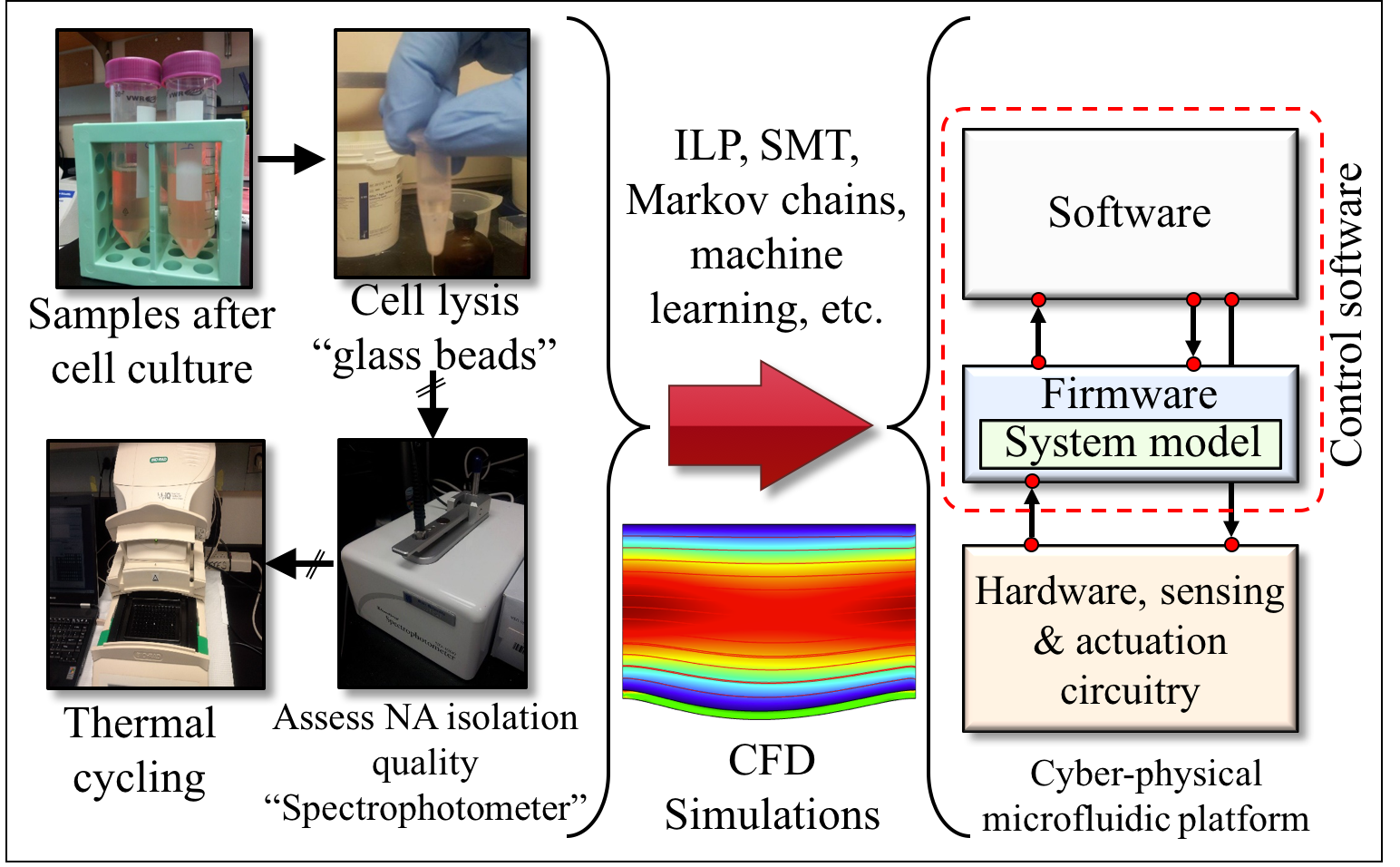
Considerable effort has been devoted in recent years to the design and implementation of microfluidic platforms for biomolecular quantitative analysis. However, today's platforms suffer from the drawback that they were optimized for sample limited analyses, thus they are inadequate for practical quantitative analysis and the processing of multiple samples through independent pathways. Design optimization techniques for microfluidics have been studied in recent years, but they overlook the myriad complexities of biomolecular protocols and are yet to make an impact in microbiology research. The realization of microfluidic platforms for real-life quantitative analysis requires a new optimization flow that is based on the realistic modeling of biomolecular protocols.
Motivated by the above needs, this project is focused on an optimized and trustworthy transfer of benchtop biomolecular analysis, particularly epigenetic studies, to programmable and cyber-physical microfluidic biochips. In collaboration with Duke Molecular Genetics and Microbiology, Mohamed has transferred gene-expression analysis and epigenetic protocols, e.g., chromatin immunoprecipitation, from bench-scale settings and has streamlined a generic optimization flow for various classes of biomolecular analysis protocols. Adopted optimization methods were based on cyber-physical system integration, real-time systems, CFD simulations, formal methods, modeling of stochastic processes, regression analysis, and more.
Selected Publications: [J4][J7][J10][J13]
Improving Trust in Emerging Microfluidic Biochips-based DNA Forensics
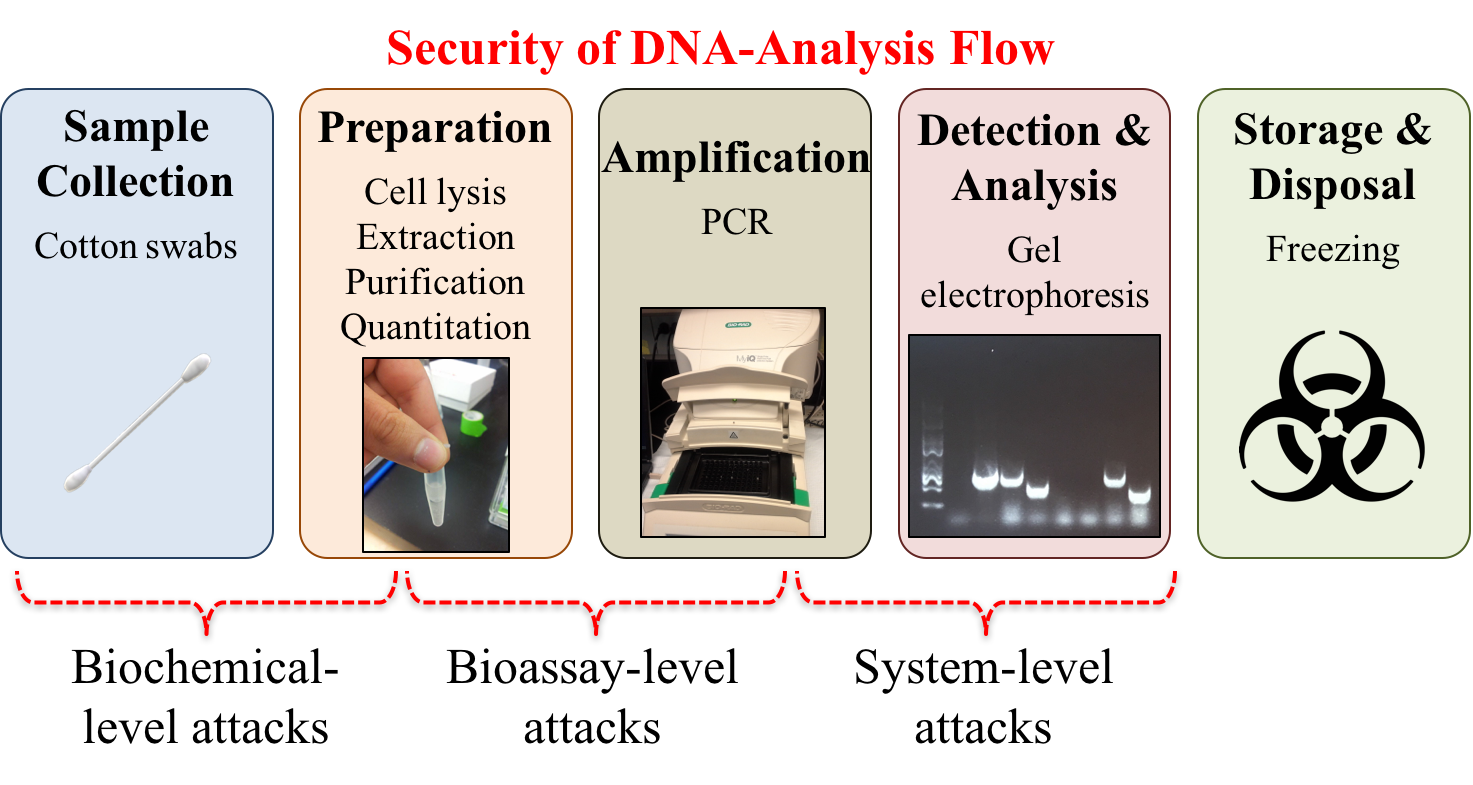
Microfluidics-driven biomolecular analysis can offer remarkable benefits, especially for mission-critical applications such as forensic DNA analysis. Several microfluidic commercial developers, including U.S.-based IntegenX, ANDE, and Lockheed Martin, have already started to roll out prototypes aiming to replace traditional benchtop procedures for DNA forensics, and it is anticipated that design automation and cyber-physical integration will play a significant role in advancing this technology. However, the pressure to drive down costs besides the proliferation of IoT-based connectedness will lead to cheap untrusted microfluidic devices and a multitude of unanticipated privacy violations if preventative measures are not taken. Trustworthy DNA forensic science are particularly relevant to defense applications and broader security needs.
Sensitive information in a microfluidic device can include data collected after processing of the fluids and personally identifying metadata. Irresponsible handling of patient data has led to the breakup of companies in the past, and current device makers would do well to learn from those mistakes. Other issues include trust in the sensor readings themselves; the rise and fall of Theranos, and the invalidation of two years worth of test results set a poor precedent for microuidics diagnostics. The nascent nature of microfluidics in biomolecular quantitative analysis presents an opportunity to incorporate security and trust in such critical applications before it becomes too late to rescue this rising industry from security threats.
Motivated by the above needs, this project is focused on creating the science of secure DNA forensics with the help of microfluidics technology. In collaboration with NYU Center for Cybersecurity (Professor Ramesh Karri's group) and Duke Molecular Genetics and Microbiology, Mohamed has worked on the assessment of the security implications of emerging forensic flows and has also provided appropriate countermeasures to secure such flows.
Selected Publications: [J2][J3][J19]
The Internet of Microfluidic Things: An Integrative Cyber-Physical System for Large-Scale Microfluidics-Driven Diagnostics
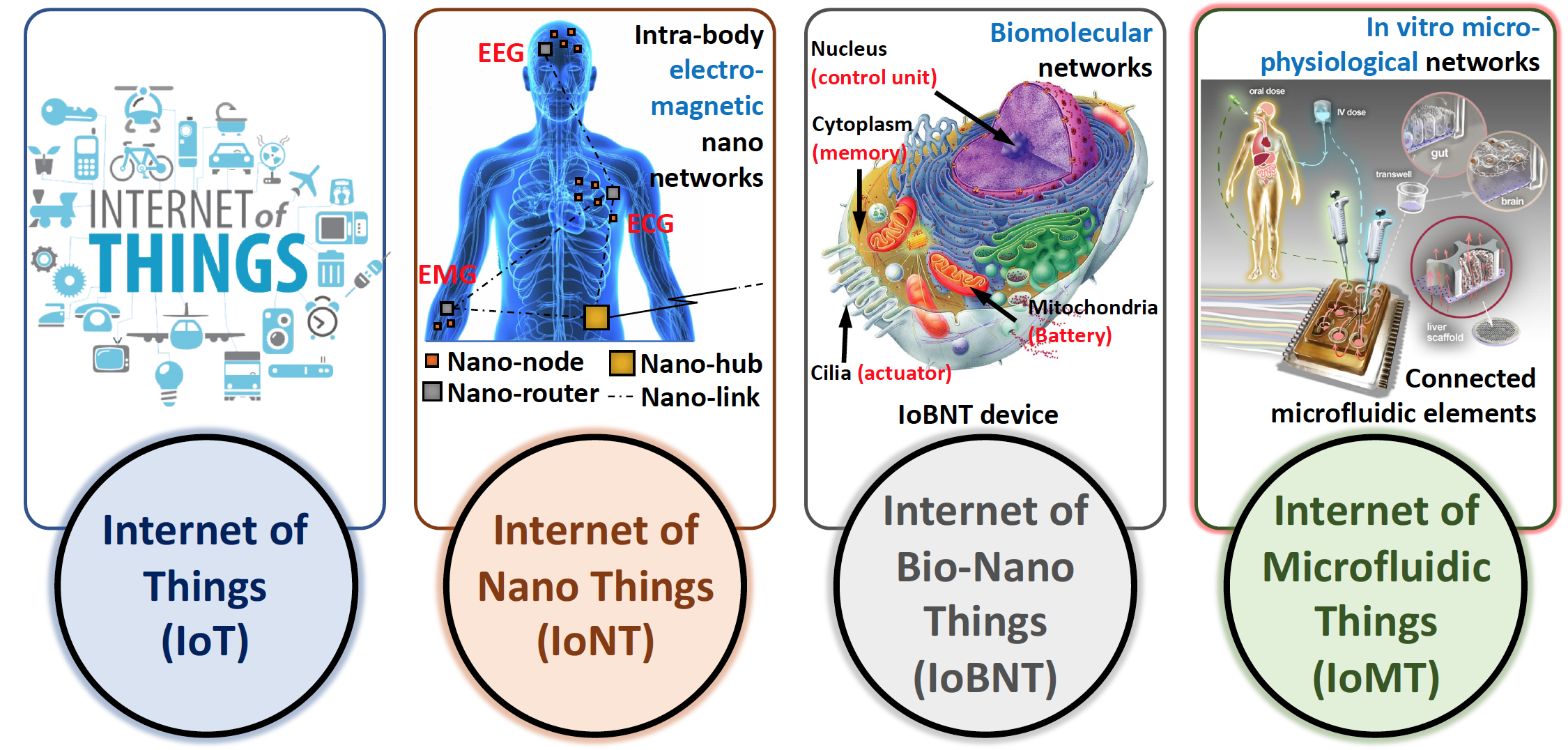
The integration of microfluidics and biosensor technology is transforming microbiology research by providing new capabilities for clinical diagnostics, cancer research, and pharmacology studies. This integration enables new approaches for biochemistry automation and cyber-physical adaptation. Similarly, recent years have witnessed the rapid growth of the Internet of Things (IoT) paradigm, where different types of real-world elements such as wearable sensors are connected and allowed to autonomously interact with each other. Combining the advances of both cyber-physical microfluidics and IoT domains can generate new opportunities for knowledge fusion by transforming distributed local microfluidic elements into a global network of coordinated microfluidic systems.
This research aims to streamline this transformation and it presents a research vision for enabling the Internet of Microfluidic Things (IoMT). To leverage advances in connected Microfluidic Things, the research introduces new perspectives on system architecture, and describe technical challenges related to design automation, temporal flexibility, security, and service assignment. This vision can play a critical role in advancing the responses of clinical healthcare to global pandemics such as COVID-19. It can also be used to support complex cancer research and pharmacology studies.
Selected Publications: [J5][J8][C19]
Hardware-Software Codesign for Real-Time Error Recovery in Cyber-Physical Digital Microfluidic Biochips
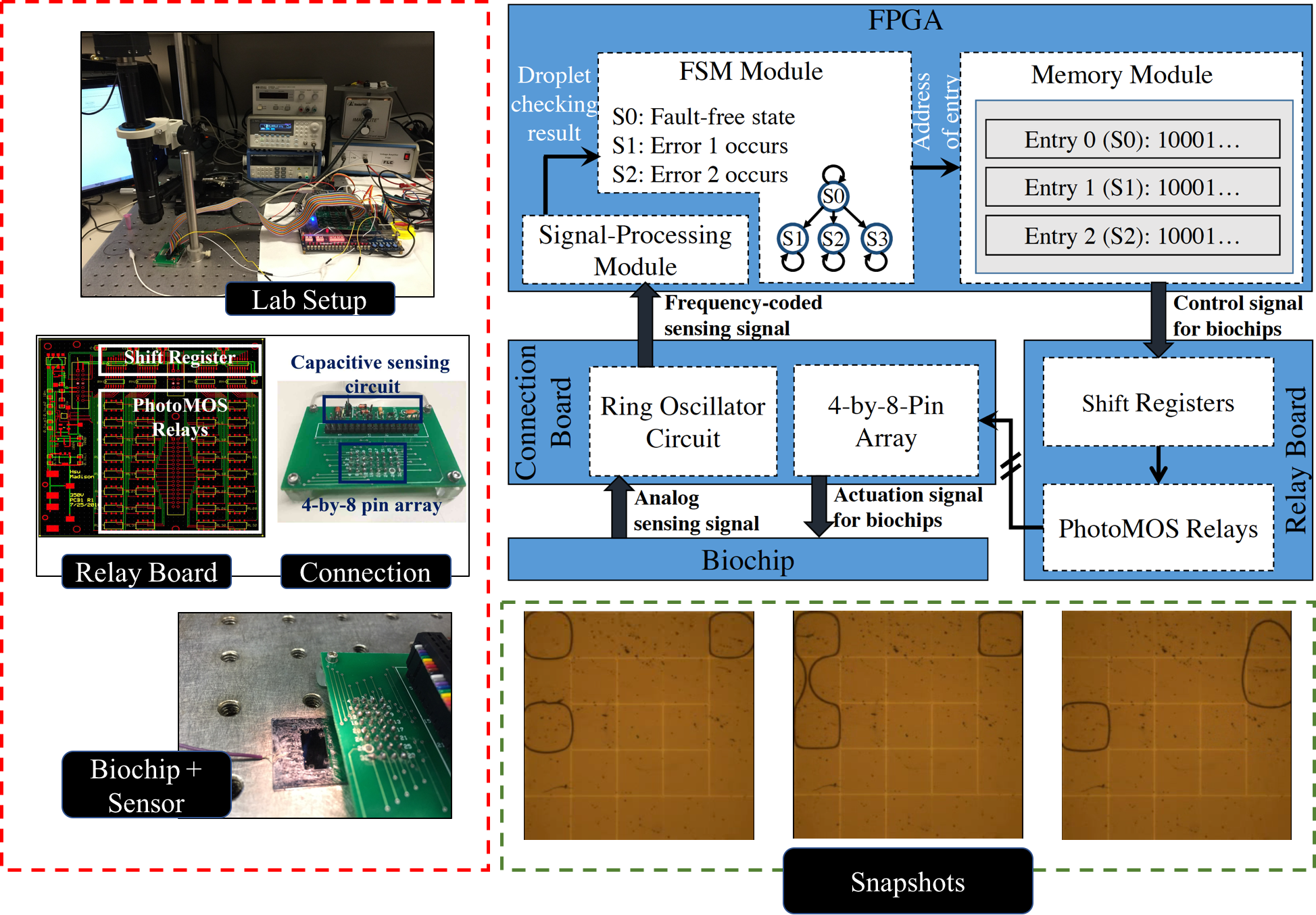
Digital microfluidics is a reconfigurable lab-on-chip technology that has achieved remarkable success in miniaturizing point-of-care (POC) quantitative-analysis testing. However, a major stumbling block in the monitoring and controlling of diseases via such POC systems is the lack of reliable diagnostic tests that can recover from unexpected errors. In addition, diagnostic tests, similar to all other quantitative-analysis procedures, are inherently stochastic systems that exhibit complex interactions among their constituent biochemical components. Such characteristics signify the need for real-time error-recovery methods that verify the correctness of on-chip fluidic interactions on-the-fly during bioassay execution.
To add resilience to digital-microfluidic control, Mohamed first introduced an efficient design method for digital microfluidic platforms to support error detection and recovery. The proposed design is based on cyber-physical system integration and it enables real-time monitoring of biochemical reactors (droplets) using capacitive sensors. Mohamed and his colleagues from Duke Microfluidics Lab designed and tested an all-hardware implementation of a cyber-physical microfluidic platform, thus enabling a portable POC setting that is resilient against faults.
Sample Publications: [J1][C1][C2]
Teaching
UC Berkeley:
- 2021: Computing with High-Dimensional Vectors (Neuroscience 299): Guest Lecturer
Duke University:
- 2018: VLSI System Testing (ECE-538): Graduate Teaching Assistant
- 2016: CMOS VLSI Design Methodologies (ECE-539): Guest Lecturer
- 2015: Programming, Data Structure, and Algorithms in C++ (ECE-551): Graduate Teaching Assistant
- 2014: Computer Architecture (ECE-250): Graduate Teaching Assistant
Ain Shams University:
- 2011-2013: Computer Organization I (CSE-211): Teaching Assistant
- 2012-2013: Computer Organization II (CSE-311): Teaching Assistant
- 2011-2012: System Dynamics and Control Components (CSE-271): Teaching Assistant
- 2011-2012: System Modeling and Simulation (CSE-467): Teaching Assistant
Proposal Writing
During my Ph.D. studies, I worked with my advisor, Professor Chakrabarty, on four grant proposals. I made major contributions to the following funded grants:
- 2017: National Science Foundation "CCF-1702596": Microbiology on a Programmable Biochip: An Integrated Hardware/Software Digital Microfluidics Platform.
- 2017: U.S. Department of Defense, Army Research Office (ARO) "W911NF-17-1-0320": Improving Trust in Emerging Digital Microfluidic Biochips-based DNA Forensics.
Academic Services
Technical Program Committee Member:
- IEEE/ACM Design, Automation and Test in Europe Conference (DATE): 2019 - Present.
- IEEE/ACM International Conference on Computer-Aided Design (ICCAD): 2021 - Present.
- IEEE International Conference on Application-specific Systems, Architectures and Processors (ASAP): 2025 - Present.
- IEEE/ACM Asia and South Pacific Design Automation Conference (ASP-DAC): 2025 - Present.
- IEEE Computer Society Annual Symposium on VLSI (ISVLSI): 2019 - 2022.
- IEEE International Conference on VLSI Design (VLSID): 2019, 2026.
- IFIP/IEEE International Conference on Very Large Scale Integration (VLSI-SoC): 2019.
Journal Reviewer:
- IEEE Transactions on Circuits and Systems for Artificial Intelligence (TCASAI)
- IEEE Transactions on Computer-Aided Design of Integrated Circuits and Systems (TCAD)
- IEEE Transactions on Very Large Scale Integration Systems (TVLSI)
- IEEE Transactions on Biomedical Circuits and Systems (TBioCAS)
- ACM Transactions on Design Automation of Electronic Systems (ACM TODAES)
- ACM Journal on Emerging Technologies in Computing Systems (ACM JETC)
- Integration, the VLSI Journal (Elsevier)
- Microelectronics Journal
Conference Reviewer:
- IEEE/ACM Design, Automation and Test in Europe Conference (DATE)
- IEEE/ACM Design Automation Conference (DAC)
- IEEE/ACM International Conference on Computer-Aided Design (ICCAD)
- IEEE International Symposium on Circuits and Systems (ISCAS)
- IEEE European Test Symposium (ETS)
- ACM International Conference on Nanoscale Computing and Communication (NanoCom)
- IEEE International Conference on Artificial Intelligence Circuits and Systems (AICAS)
Mentorship
Georgia Tech:
- Zishen Wan: Ph.D. student (2023 - 2025).
UC Berkeley:
- E. Lin, J. Qiao, L. Zhang: MEng Students -- through Berkeley's Fung Institute Leadership Program (2023 - 2024).
- S. Desai, Y. He, A. Pan, N. Santoso, W. Sun, C. Symes, and Y. Wang: MEng Students -- through Berkeley's Fung Institute Leadership Program (2022 - 2023).
Duke University:
- Emily Zhao: Undergraduate CS/ECE Student -- through Pratt Alumni Mentorship Program (2024 - 2025).
- Aditya Sridhar: Undergraduate CS Student (2016 - 2018).
- Craig Boswell: Pratt Undergraduate Fellow (2015 - 2016).
Technical University of Munich:
- Yasamin Moradi: Ph.D. student (2016 - 2017).
Industry
- 2019 - 2021: SoC Design Engineer (Full Time), Intel Santa Clara, CA, USA.
- 2017: DFT Engineer (Internship), Intel Santa Clara, CA, USA.
- 2015, 2016: SoC DFX Design Engineer (Internship), Intel Austin, TX, USA.
- 2011 - 2013: VLSI Design and Verification Engineer (Part Time), Newport Media Inc., Cairo, Egypt.
- 2010 - 2011: VLSI Design Engineer (Full Time), Mentor Graphics, Cairo, Egypt.
- 2009: Embedded Systems Engineer (Internship), Mentor Graphics, Cairo, Egypt.
